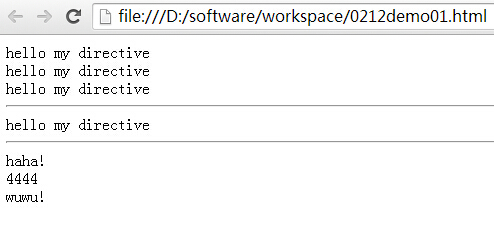AngularJS支持用户自定义标签属性,在不需要使用DOM节点操作的情况下,添加自定义的内容。
前面提到AngularJS的四大特性:
1 MVC
2 模块化
3 指令
4 双向数据绑定
下面将会介绍如下的内容:
1 如何自定义指令
2 自定义指令的使用
3 自定义指令的内嵌使用
如何自定义指令:
Angular是基于模块的框架,因此上来肯定要创建一个自己的模块:
var myAppModule = angular.module("myApp",[]);
然后在此模块基础上创建指令directive
myAppModule.directive("xingoo",function(){
return{
restrict:'AECM',
template:'<div>hello my directive</div>',
replace:true
}
});
其中,xingoo是我们自定义标签的名字,后面跟着它的方法函数。
函数return了一个键值对组合,其中定义了标签的使用方法、属性等等内容。
那么看看它都定义了哪些内容吧:
1 restrict:定义了标签的使用方法,一共四种,分别是AECM
2 template:定义标签的模板。里面是用于替换自定义标签的字符串
3 replace:是否支持替换
4 transclude:是否支持内嵌
如何使用指令:
上面提到了标签的四种使用方法,即AECM。
A attribute属性:当做属性来使用
<div xingoo></div>
E element元素:当做标签元素来使用
<xingoo></xingoo>
C class类:当做CSS样式来使用
<div class="xingoo"></div>
M comments注释:当做注释使用(这种方式在1.2版本下亲测不可用!)
<!-- directive:xingoo --> <div></div>
一般来说推荐,当做属性和元素来使用。
当想要在现有的html标签上扩展属性时,采用属性的方式。
当想要自定义标签时,采用标签的形式。
想要使用那种方式,必须要在定义directive中的restrict里面声明对应的字母。
指令的内嵌使用:
因为标签内部可以嵌套其他的标签,因此想要在自定义标签中嵌套其他的元素标签,则需要:
1 使用transclude属性,设置为true。
2 并使用ng-transclude属性,定义内部嵌套的位置。
代码如下:
myAppModule.directive("test",function(){
return{
restrict:'AECM',
transclude:true,
template:"<div>haha! <div ng-transclude></div> wuwu!</div>"
}
});
全部代码
<!doctype html>
<html ng-app="myApp">
<head>
<meta http-equiv="Content-Type" content="text/html; charset=utf-8" />
<script src="http://apps.bdimg.com/libs/angular.js/1.2.16/angular.min.js"></script>
</head>
<body>
<xingoo></xingoo>
<div xingoo></div>
<div class="xingoo"></div>
<!-- directive:xingoo -->
<div></div>
<hr>
<xingoo>3333</xingoo>
<hr>
<test>4444</test>
<script type="text/javascript">
var myAppModule = angular.module("myApp",[]);
myAppModule.directive("xingoo",function(){
return{
restrict:'AECM',
template:'<div>hello my directive</div>',
replace:true
}
});
myAppModule.directive("test",function(){
return{
restrict:'AECM',
transclude:true,
template:"<div>haha! <div ng-transclude></div> wuwu!</div>"
}
});
</script>
</body>
</html>
运行结果
